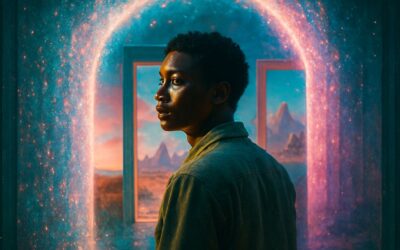Introduction
What is your most vivid childhood memory? The story of your first love? The moment you achieved a great success? What if I told you that memory might be wrong? This week, in our series finale, we tackle the most personal biases of all—the ones that live inside our own heads. We’ll discover how easily false memories can be planted, why we only remember the best and worst moments of a vacation, and how you might be accidentally stealing ideas. Prepare to question everything you think you know about your past.
Short Story
Two siblings, Anna and Ben, are looking through an old photo album. Anna points to a picture of them at the beach and launches into a detailed story about how she got a terrible sunburn that day. Ben is confused. He reminds her that she’s thinking of a different trip; on this day, it was cloudy and cool. He shows her an article he’s reading about that exact beach, which mentions that jellyfish are common. Suddenly, Anna starts to “remember” seeing a jellyfish near her in the water (Misinformation Effect / False Memories). Later, Ben starts excitedly describing a “brilliant” and “original” idea he had for a new app. Anna gently reminds him that their cousin, a software developer, described the exact same app to them last year (Cryptomnesia / Source Monitoring Error). When their mom asks if the week-long trip was fun, they both enthusiastically say “Yes!” Their entire memory of the vacation is defined by the one thrilling day they spent at an amusement park (Peak), and the pleasant feeling of the drive home (End), completely forgetting the four days of rain and boredom in between (Peak-End Rule).
Explanation
This trip down memory lane shows that our past is not a perfect record; it’s a reconstruction filled with errors. Let’s examine the biases:
- Misinformation Effect & False Memories: The mention of jellyfish planted a new, false detail into Anna’s memory of the day. We’ll explain that our memories are highly suggestible, and post-event information can easily merge with and alter our original recollection, sometimes creating memories of things that never happened.
- Cryptomnesia & Source Monitoring Error: Ben’s “original” idea is a classic case of cryptomnesia. His brain retained the information but failed to store the source, leading him to believe the idea was his own.
- Peak-End Rule: The siblings’ overall positive memory of the vacation is governed by this rule. We don’t average our experiences. Instead, our memory disproportionately weighs the most emotionally intense moment (the peak) and the final moment (the end). This explains why a bad ending can ruin a great day, or a great ending can save a terrible one.
Language Focus
- Vocabulary: To recall, to recollect, vivid, source, to implant, fallible, reconstruction, nostalgia.
- Grammar: We’ll focus on Past Modals of Certainty and Possibility to talk about memories. For example: “She must have confused it with another trip.” “He might have heard the idea somewhere.” “I definitely remember feeling happy.”
- Speaking Skill: Collaborative Recalling. The next time you’re with a friend or family member with whom you share a memory, try to retell the story together. Pay attention to the details where your memories differ. Instead of arguing about who is “right,” discuss why your memories might be different. This is a great way to see memory biases in action.
- Writing Challenge: “The Memory Time Capsule.” Choose a memorable event from your day today—a conversation, a meal, something you watched. Write down as many details as you can remember. Then, set a reminder on your phone for one month from now. On that day, write down your memory of the same event again before you read your original entry. Finally, compare the two versions. What details remained? What faded? What changed? Write a short reflection on what this tells you about your own memory.
Outro & Series Wrap-Up
“Our memories, it turns out, are more like stories we tell ourselves than records of the past. And that’s a perfect place to end our series. From the way we make decisions, to how we see ourselves and others, to the very memories that make us who we are, cognitive biases are woven into every aspect of our lives. They are not a flaw in our design; they are the shortcuts our brains use to navigate a complex world. We can never eliminate them, but by bringing them into the light, we can become more thoughtful, critical, and empathetic human beings. Thank you for joining us on this journey into the mind.”










0 Comments